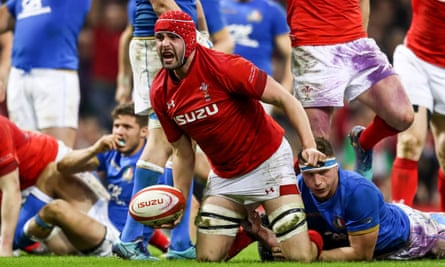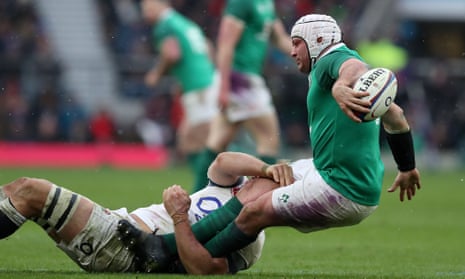1) Rory Best
The Ireland captain was asked after the grand slam victory whether Eddie Jones’s derogatory remarks about the country revealed a few days before had been motivation for the champions. Best showed class in his reply that was to the effect: who had not found themselves in a position like that? The most-capped player in the team is not among the most celebrated, but every side needs a Best to hold it together, selfless to the point where the team comes first, second and third. He has been on two Lions tours and did not make a Test appearance, but there was never any moaning or boat-rocking. He will be 36 in August and the head coach, Joe Schmidt, will have to decide whether a key part of his set-up will make it to the World Cup.
2) Chris Robshaw
Hero is not a word associated with England after an underwhelming defence of their title but Robshaw was their one player who lived up to his reputation. He was chosen out of position on the open-side for the most part and England struggled at the breakdown throughout, but that was down to a system failure, certainly when in possession, rather than who was wearing the 7 jersey. He captained England for four years, but he carries no ego, never hiding and always doing the unglamorous, often unseen work, someone who would uncomplainingly take out the bins on a cold, wet night week after week.
3) Cory Hill
Wales’ second-rows have their partner and captain, Alun Wyn Jones, to live up to. Hill was not much heard of outside Wales when he was chosen to start his first Six Nations match against Scotland in the opening round one week before his 26th birthday, having made his Test debut off the bench against Australia the previous season. He epitomised the tight-five forward Wales have been asking their regions to hone in recent years, athletic, mobile and able to receive and give a pass while also weighing in at the set-pieces. Hill was given his opportunity because of Jake Ball’s injury, but he still had to hurdle Bradley Davies and Luke Charteris. One of three Wales players to start every match this Six Nations, he had entrenched himself by its end.

4) Greig Laidlaw
The Scotland scrum-half’s international career looked to have been reduced to a walk-on role when he was left out of the side to face Wales having missed the galvanising autumn campaign through injury. Ali Price was better suited to the fluid, all-action style patented by Glasgow, but after 48 minutes at the Principality Stadium, with the game all but lost, on came the 32-year-old Laidlaw. It was too late to alter the result, but he was back in the saddle the following week against France, kicking six penalties in the second half and adding a pinch of pragmatism after moving to outside-half, as he did in the final match against Italy that he won with a late penalty. Sometimes it is not about who has the swiftest pass or the fastest legs, but who thinks the quickest and keeps their head when others have given up trying to find theirs.
5) Sergio Parisse
Not so much an unsung hero as a song sung blue after the Italy captain suffered his 100th Test match defeat against Scotland having been within a couple of minutes of what would have been a victory only the most flint-hearted would have begrudged them. After 17 seasons as a professional – he won the first of his 134 caps in 2002 – his most productive years are behind him, but he has snubbed time and the physical toll the game takes on players to continue to strive to make Italy a credible part of the Six Nations. He delayed retirement to help his head coach, Conor O’Shea, and two of the game in Rome’s most prominent players last Saturday – the flankers Sebastian Negri and Jake Polledri – are profiting from his experience: his mind, their legs and bodies. Italy have taken some beatings this year, but Parisse has remained on the field throughout, defiant and leading by example to the very end.

Comments (…)
Sign in or create your Guardian account to join the discussion